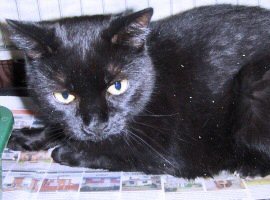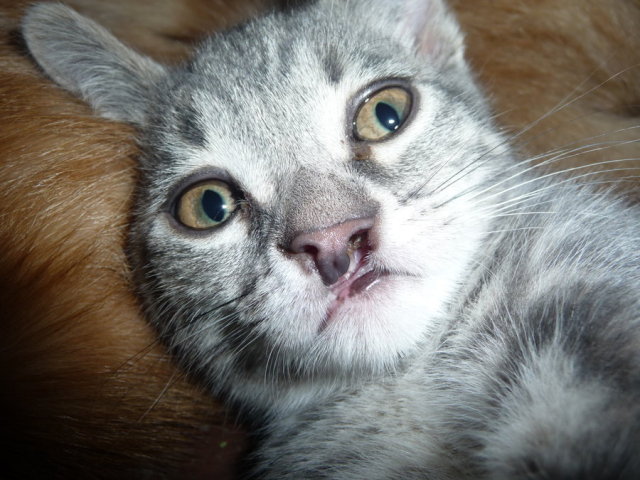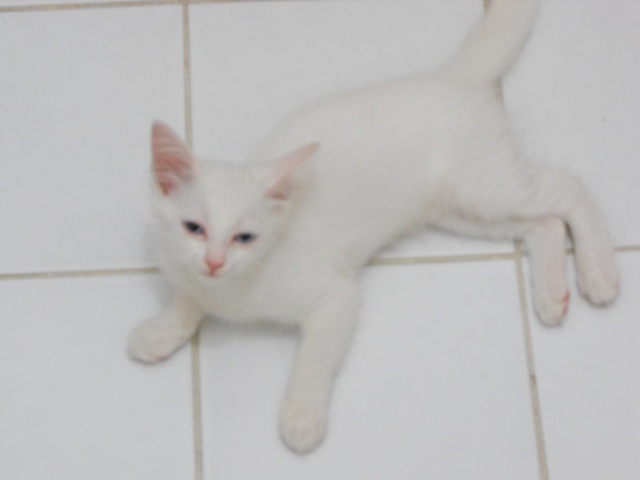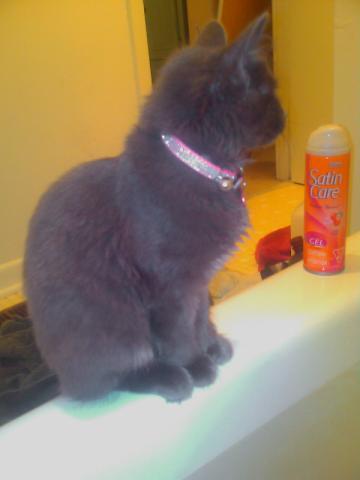QuestionI have a male kitty who will be 19 in January.
He gets pork liver every day with his medicine, Felovite, (a vitamin for some type of heart cond.) an appetite stimulant and Cosequin for pain. (arthritis)
Well, I've noticed that in the last week or 2 that he can't seem to stand on his feet. He 'wobbles' when walking to his food or water.
So is this normal or something to be concerned about?
His hip/legs stick out past his body. ('I'm assuming its due to his arthritis)
AnswerJoyce,
This little old man is definitely showing signs of his age from the sounds of things, but I would like to be clear with you - unfortunately I am not a veterinarian and I can't make any kind of diagnosis or prescribe any treatments for pets. Since your kitty has only recently begun having issues standing steadily on his own I really do think that you should have him re-assessed by your family veterinarian ASAP just to be sure that there isn't something more serious going on that requires treatment of any kind. I am a bit concerned about the fact that your kitty does get liver on a daily basis because too much liver can cause issues with excessive amounts of vitamin A and an imbalance of calcium and phosphorus in your cat's body which can create some serious problems for him in and of itself, so make sure that you let your veterinarian know how much liver you've been feeding your kitty daily and how long he's been getting that amount of liver so that your vet can determine whether or not this is playing a role in your kitty's current change in health status. One treat your kitty might enjoy that wouldn't create this issue would be pureed chicken breast, turkey or beef that's been heated slightly to room temperature - I generally use meat/broth baby food purees just be sure that the food you choose doesn't contain any onions as they are toxic to cats, avoiding salt or sugar is important too.
There is a possibility that your little man's medical condition is beginning to deteriorate some or he may just be growing a bit weaker with age, either way this isn't the kind of issue that you want to take a "wait and see" approach to dealing with because the sooner that you're able to diagnose and treat potentially serious issues with an older cat the better the outcome will be for them. From the very brief history that you've given in your question I do have some concerns about your kitty's ongoing quality of life based on the fact that he's being given vitamins and an appetite stimulant because it suggests to me that his appetite isn't great which can be a sign of more serious underlying issues that can adversely affect his quality of life.
Ultimately as pet parents it can be difficult to be objective about our own pet's quality of life because we love them dearly and we want to keep them with us at our side for as long as we possibly can, but for the sake of the pets that we love we must seriously consider issues that pertain to quality of life, particularly in elderly or sick pets. I know that this is a difficult topic, but I think it's important to be aware that quality of life is crucial to any pet's ongoing happiness. At this point it sounds to me like your kitty's doing okay and he seems to be in reasonably good shape for his age, but he is roughly 92 years old in human years and there is the potential for his condition to change fairly quickly with little or no warning.
Discussing quality of life issues with your family vet is probably the most important conversation you will ever have with him/her. Some important issues to address during this discussion include:
~ How to determine your kitty's quality of life.
~ How you'd like to proceed if your kitty's quality of life is negatively impacted to the point where he's experiencing pain that doesn't respond to medication or alternative modalities such as acupuncture, homeopathy or nutritional supplements like glucosamine.
~ Take this time to ask any questions you might have about euthanasia, just in case it is necessary to make this decision for your kitty at the end of his life.
~ Raise any concerns you might have about euthanasia with your veterinarian.
~ Make a plan for what you'd like to do with your kitty's remains when he does pass away.
It's much more difficult to make tough treatment decisions when an elderly pet is already in crisis and he seems to have deteriorated without warning. It's helpful for the vet to know where you stand and it's important that your vet is honest with you and feels comfortable giving you information that might be difficult to hear...If you've agreed ahead of time with your vet how far you're willing to go in terms of intervening with your precious boy's natural aging process then the vet can offer you valuable insight about quality of life issues as they arise which will ultimately be better for you, because although it's never easy to lose a pet it's definitely easier to cope with if you know what to expect whether your cat dies of natural causes at home or must be humanely euthanized to alleviate suffering at the end of his life. The more information that you have the easier it will be on your little guy should a crisis situation happen, because you'll be better prepared and more able to make the right decisions for him if it becomes necessary to intervene. I do keep extensive information on the grieving process and coping with the loss of a pet and I'd be happy to pass that information along to you at any time, so please don't hesitate to contact me again if you do need this information.
As far as treating arthritis pain you may want to consider adding treatments by a veterinary acupuncturist and/or homeopathic remedies to his current treatment plan - these modalities work well to manage arthritis (and other types of) pain without the potential for the serious side effects that traditional allopathic drugs have. Unfortunately many pain medicines and anti-inflammatory type medicines commonly prescribed in the Western world can cause serious kidney and liver issues, particularly in older pets whose organs function less efficiently and are less resilient than they would be in a younger pet so my recommendation would be to avoid these medicines if at all possible or at the very least keep the doses at the lowest possible levels for the sake of your little guy's longer term wellbeing.
Cats have been known to live into their mid-twenties depending on their diet, lifestyle, whether or not they've been over-vaccinated, how much exposure they've had to harsh chemicals in their environment or traditional allopathic medications and how much stress they've been exposed to over the course of their lifetime. I can't really speak to your little guy's life expectancy because I don't know enough about his life/medical history or where he's at in terms of his current medical state, but it's fair to say that there is at least a possibility that your kitty will live at least a few years more. Generally when it comes to caring for cats my philosophy is to keep things as natural as possible for my cats because I truly believe that if we stick close to nature we can't go too far wrong in the care of our pets. Hopefully the information that I've been able to provide is helpful for you and your little old man. If you have any further cat related questions or concerns please don't hesitate to contact me again, I'm more than happy to help you out to the best of my ability.

 Worried that my cat has a UTI??
Question
Oscar
Hello,
My name is Danielle and I have t
Worried that my cat has a UTI??
Question
Oscar
Hello,
My name is Danielle and I have t
 Cleft Lip
Question
Cleft Lip Kitty
Hi Ali,
I have a cat thats 11
Cleft Lip
Question
Cleft Lip Kitty
Hi Ali,
I have a cat thats 11
 Kitten breed
Question
Minnoo
Dear Sir,
I brought home a female kitte
Kitten breed
Question
Minnoo
Dear Sir,
I brought home a female kitte
 urgent cat problem
Question
kitty aka chanel
my cat is about 7 mont
urgent cat problem
Question
kitty aka chanel
my cat is about 7 mont
 cat identification
Question
pic was from my phone,
i am currently f
cat identification
Question
pic was from my phone,
i am currently f